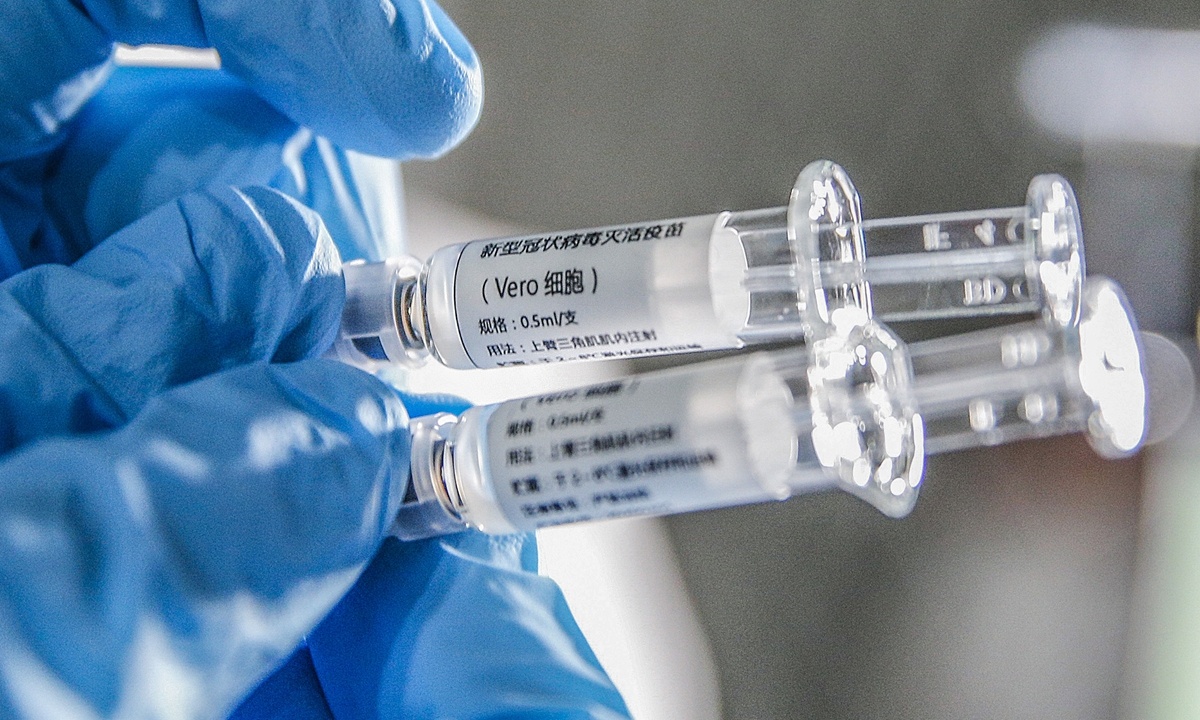
A staff member displays samples of the COVID-19 inactivated vaccine at Sinovac Biotech Ltd., in Beijing, capital of China. (Photo: Xinhua)
China's vaccine makers have been at a low ebb in recent years after a number of scandals including Changsheng Bio-technology Co's fabrication of data and sales of substandard vaccines for babies in 2018 which wrecked public trust and infuriated parents. These days things appear to be changing as a number of promising COVID-19 vaccines have helped the sector regain public confidence.
Within a number of months, officially approved vaccines are expected around the world, less than a year since the coronavirus was first detected and far faster than the eight to 10 years usually needed to develop a vaccine.
China has designed five COVID-19 vaccine candidates, all of which have entered human clinical trials. WHO data on September 22 shows that clinical trials of 11 COVID-19 vaccines are underway, four of which have entered phase three trials.
A phase three clinical trial project on a recombinant adenovirus vaccine named Ad5-nCoV jointly developed by Chinese company CanSino Biologics Inc (CanSinoBIO) and military infectious expert Chen Wei was launched on September 22 in Pakistan, following another phase three clinical trial of the vaccine in Russia, the company told the Global Times.
Volunteers participating in the phase one clinical trials of Ad5-nCoV will get their second shots on Saturday to enhance and prolong the immunity.
The Ad5-nCoV vaccine, taken either by intramuscular or nasal mucosal injection, is expected to be effective for two years after injection. It has to be stored at 2 to 8 degrees Celsius, Zhu Tao, CanSino's chief scientific officer, said at China Vaccine Innovation Forum 2020 held in Taizhou, East China's Shandong Province over the weekend.
The vaccine's effectiveness has been called into question due to tests showing low antibodies in previously published phase one and two trial data. However, Zhu said that the neutralizing antibody of the vaccine may have been seriously underestimated, and that a single dose of immunity can achieve the equivalent effect of two doses of inactivated vaccine. He also stressed that different testing methods can seriously affect antibody testing data.
The data show that the Ad5-nCoV vaccine is no less effective than the same-typed Ad26 vaccine already approved in Russia.
China's only nasal spray coronavirus vaccine started phase one clinical trials in Dongtai, East China's Jiangsu Province on September 1. This COVID-19 vaccine candidate is the first in the world to be administered via a nasal spray.
The vaccine is co-developed by researchers at Xiamen University and Hong Kong University, and will be produced by vaccine maker Beijing Wantai Biological Pharmacy Enterprise Co, Zhang Jun, one of the leading members of the vaccine research team, told the Global Times. The nasal spray contains deactivated flu virus.
SARS-CoV-2 entry factors are highly expressed in nasal epithelial cells together with innate immune genes. The nasal spray vaccine can simulate the natural infection path of novel coronavirus to activate the local immune response and the body's immune response so as to play the dual protection. The technology has been widely applied and has become more mature overseas, said Zhang.
"Hong Kong and the mainland have maintained close communication in this regard as a solid team," Zhang told the Global Times.
A COVID-19 DNA-based vaccine IN0-4800, a traditional vaccine type, co-developed by the US Inovio and Chinese company Advaccine is expected to start its late-stage clinical trials in October in the US, when phase two trials will start in China, Cheng Xin, medical director of Advaccine, said at the conference.
Phase one and two clinical trials of the vaccine conducted in the US have seen 120 volunteers receive two doses of the vaccine.
Currently, clinical trials in China have been extended to the elderly and minors, the leading Chinese vaccine company Sinopharm previously told the Global Times.
Clinical trials of Chinese vaccine candidates are now covering a wider population in order to obtain more comprehensive data. Trials are prioritizing adults, then the elderly, adolescents and younger children, Gao Chenyan from China's National Medical Products Administration said at the conference, saying that infants and very young children should not receive the vaccine at present.


